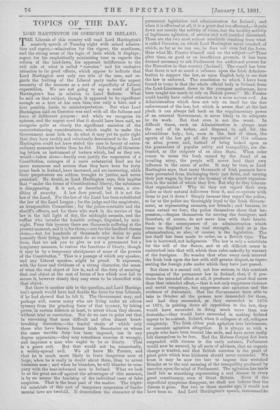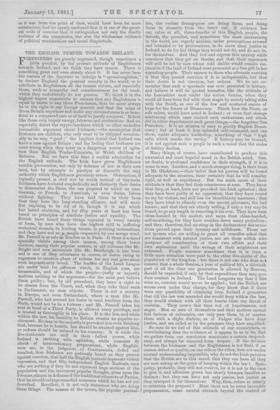TOPICS OF THE DAY.
--t-
LORD HARTINGTON ON COERCION IN IRELAND.
THE Liberals of this country will read Lord Hartington's masterly speech of Tuesday night with mixed admira- tion and regret,—admiration for the vigour, the manliness, and the strong sense of the logic of facts which it displays ; regret for his emphatically minimising tone as regards the reform of the land-laws, his apparent indifference to the evil side of what is called " coercion " and his exclusive attention to its good effects, which appear to indicate that Lord Hartington sees only one side of the ease, and re- gards the fretting of the Liberal party under the urgent necessity of the moment as a sort of superfluity of Liberal superstition. We are not going to say a word of Lord Hartington's line in relation to Land Reform. What he said on that subject, though it appeared to be significant enough as a hint of his own bias, was only a hint, and a hint possibly liable to misinterpretation. But what Lord Hartington said on Coercion was said with all the fullness and force of deliberate purpose ; and while we recognise its aptness, and the urgent need that it should have been said, we recognise quite as clearly the significant omission of the counterbalancing considerations, which ought to make the Government most loth to do what it may yet be quite right that they have tardily and reluctantly determined to do. Lord Hartington could not have stated the case in favour of extra- ordinary measures better than he did, Deducting all threaten- ing letters, an instrument of torture which, bad as they are, would—taken alone—hardly ever justify the suspension of a Constitution, outrages of a more substantial kind are far more numerous and serious than they have been for forty years back in Ireland, have increased, and are increasing, while their perpetrators are seldom brought to justice, and never punished. No doubt, as Lord. Hartington says, this implies that " under the forms of Constitutional liberty, the substance is disappearing. It is not, as described by some, a con- dition of anarchy. A law does prevail, but it is not the law of the Land. For the law of the Land has been substituted the law of the Land League ; for the judge and the magistrate, an irresponsible Committee ; for the police-constable and the sheriff's officers, and for those who work in the service of the law in the full light of day, the midnight assassin, and the ruffian who invades the humble cottage, disguised, by mid- night. From this tyranny there are thousands suffering at the present moment, and it is for them,—not for the landlord classes alone,—but for hundreds of thousands who desire to gain honestly their living, but cannot do so except in fear of their lives, that we ask you to give us not a permanent but a temporary measure, to restore the functions of liberty, though it may be by a temporary abridgment of some of the powers of the Constitution." That is a passage of which any speaker, and any Liberal speaker, might be proud. It expresses, with the force and vividness of a strong character, the sense of what the real object of law is, and of the duty of securing that real object at the cost of forms of law which now fail to secure it, however closely they may seem to be identified with that object.
But there is another side to the question, and Lord Harting- ton's speech would have had double the force for true Liberals, if he had showed that he felt it. The Government may, and perhaps will, rescue many who are living under an odious tyranny from the grinding force of that tyranny, by taking power, in certain districts at least, to arrest whom they choose, without trial or conviction. Nor do we care to point out that in exercising that most difficult and often almost heart- breaking discretion,—the fearful strain of which only
those who have known former Irish Secretaries on whom the same terrible duty has been imposed, can in any degree appreciate,—they may sometimes exercise it wrongly, and imprison a man who ought to be at liberty, That is a grave evil. But that would not be, numerically, a widely-spread evil. We all know Mr. Forster, and that he is much more likely to leave dangerous men at large, when he is really in doubt about them, than to arrest harmless men ; and when he blunders, he will blunder in com- pany with the best-informed men in Ireland, What we look to as the great set-off against the advantages of this measure, is by no means the hardship of the individual cases of false suspicion. That is the least part of the matter. The fright- ful mischiefs of this sort of temporary suspension of funda- mental laws are twofold, It demoralises the character of the
permanent legislation and administration for Ireland ; and when it is effectual at all, it is a great deal too effectual,—it puts down not merely the activity of crime, but the healthy activity of legitimate agitation, of serious and well-justified discontent. These are the two most serious mischiefs resulting from what is called Coercion, on which Lord Hartington never touched, of which, so far as we can see, he does not even feel the force. Hear what Mr. Forster himself said on the subject :—" Time• after time, on good or on insufficient grounds, it has been• deemed necessary to ask Parliament for additional powers for the Executive in that country [Ireland]. The result has been that there is not so much a reliance upon the Irish Adminis- tration to support the law, as upon English help to see that• the law is enforced. The conclusion to which I have been forced to come is that the whole official body in Ireland, from the Lord-Lieutenant down to the youngest policeman, have been taught too much to rely on British power." Mr. Forster could hardly have called attention to a more serious evil. An Administration which does not rely on itself for the due enforcement of the law, but which is aware that at the last; pinch it can always fall back on the supplementary power of an external Government, is never likely to be adequate
to its work. But that even is not the worst. In difficult times, such an Administration is always neap the end of its tether, and disposed to call for the adventitious help ; but, even in the best of times the agents of the law got all the reputation of this reliance on alien power, and, instead of being looked upon as the guarantees of popular safety and tranquillity, are dis- trusted, as the outposts of an alien State. When order conies to mean the hush caused by the dread of an invading army, the people will never lend their own. influence to the cause of order. It may be true, as Lord Hartington says, that many thousands of Irish peasants have been prevented from discharging their just debts, and earning their just wages, by fear of the tyranny of the secret organisa- tion in the midst of which they live. But why do they tolerate that organisation? Why do they not regard their owre police as their natural deliverers from it, and co-operate with them to put it down Simply because they regard the police, so far as the police are thoroughly loyal to the Irish Govern- ment, as representing enemies, not friends ; and because, to some extent we fear, the police themselves share that im- pression,—despise themselves for serving the foreigner, and therefore, of course, do not serve him with their hearts. Such is the consequence of an administration which leans on England for its real strength. And as is the administration, so also, of course, is the legislation. The law itself has been made to order, on a British type. The- law is borrowed, not indigenous. The law is only a substitute for the will of the Saxon, and at all difficult crises is reabsorbed into that will, which then rules nakedly by warrant of the foreigner. No wonder that after every such interval the Irish look upon the law with still greater disgust, as repre- senting the foreign yoke under which they have just passed.
But there is a second evil, not less serious, in this constant, suspension of the permanent law in Ireland, that, if it pro,- duces the intended effect at all, it produces a great deal more than that intended effecte—that it not only suppresses violence and social conspiracy, but suppresses also agitation and the- evidence of discontent. Had the Government been able to, take in October all the powers now demanded for them, and had they succeeded, as they succeeded in 1870 or 1871, in putting down all opposition to the law, they would have succeeded in doing much more than was. desirable,—they would have succeeded in making Ireland appear to be content. Ireland, when it collapses at all, collapses. completely. The Irish either push agitation into lawlessness, or renounce agitation altogether. It is always so with a people who have been treated like serfs, and have never really felt themselves to be free. Had the Habeas Corpus Act been suspended with success in the early autumn, Parliament, would now be assured, by all sorts of advisers, that no organic change is wanted, and that British coercion is the pearl of great price which true Irishmen should never surrender. We trust it may be now too late to impose this wretched blunder as to the real meaning of the tranquillity produced by coercion upon the mind of Parliament. The agitation has made itself felt as something representing a real disease in every great constituency, even of Great Britain. Even if the superficial symptoms disappear, we shall not believe that the disease is gone. But two or three months ago, it would not have been so. And Lord Hartington's speech, statesmanlike
as it was from one point of view, would have been far more satisfactory, had he openly confessed that it is one of the great- est evils of coercion that it extinguishes not only the deadly violence of the conspirator, but also the wholesome evidence of political wretchedness and social disquietude.



































 Previous page
Previous page